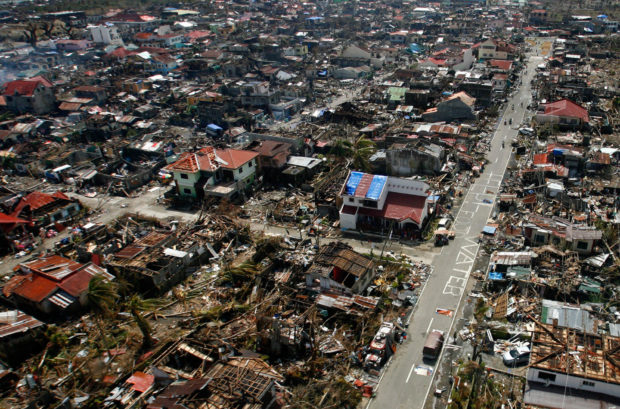
ROOFLESS Supertyphoon “Yolanda” ripped off the roofs of houses in Tanauan town, Leyte province, in this file photo. —INQUIRER FILE PHOTO
MANILA, Philippines — Malacañang marked the seventh anniversary of the Supertyphoon “Yolanda” (international name: Haiyan) disaster with the distribution of nearly 2,500 free houses in Estancia town, Iloilo province, on Friday.
Cabinet Secretary Karlo Nograles led national and local officials in the virtual turnover ceremony for Estancia Residences, Estancia Villas and Estancia People’s Village homes under the Yolanda Permanent Housing Project (YPHP) in Western Visayas.
“This week marks the seventh year since Typhoon Yolanda struck. It has remained in the public’s consciousness because of the level of destruction it brought, especially for Ilonggos and the people in the region. That’s why this free housing benefit should put a happy and fitting end to years of waiting. The Duterte administration is making good on its promise to help the people of Iloilo,” Nograles said.
Yolanda made landfall in Guiuan town, Eastern Samar province, on Nov. 8, 2013, and crossed the Visayas, leaving more than 6,300 people dead and P95 billion in damage.
Nograles thanked National Housing Authority (NHA) General Manager Marcelino Escalada Jr., Estancia Mayor Melina Requinto and other housing and local government officials for their cooperation and sense of urgency in ensuring the timely completion of the project despite the challenges posed by the COVID-19 pandemic.
According to NHA figures as of October 2020, out of a planned 135,772 houses for Western Visayas, 88,804 have already been completed, with the remaining 46,968 undergoing construction.
Livable communities
Meanwhile, Nograles, who also heads Task Force Yolanda, said on Sunday that the government was working to ensure Yolanda resettlement sites are livable communities.
“Aside from building new houses for the families displaced by this devastating typhoon, government wants to make sure that these are homes which allow these families to thrive, not just survive,” he said, adding that YPHP resettlement sites had been identified and construction on the houses had already begun when the current administration took over the program in 2016.
“What we did was to focus on making these areas livable, because we know that livelihood and education would be concerns that need to be factored in to ensure the long-term viability of these relocation sites,” he said.
“We want to do more than rebuild their homes—we want to help the victims of Typhoon Yolanda rebuild their lives,” he added.
Nograles also pointed out that one major concern was the accessibility of the communities to schools. He said he had asked the Department of Education to include Yolanda resettlement sites in its Last Mile Schools Program, which aims to provide isolated and conflict-hit areas with access to basic education.